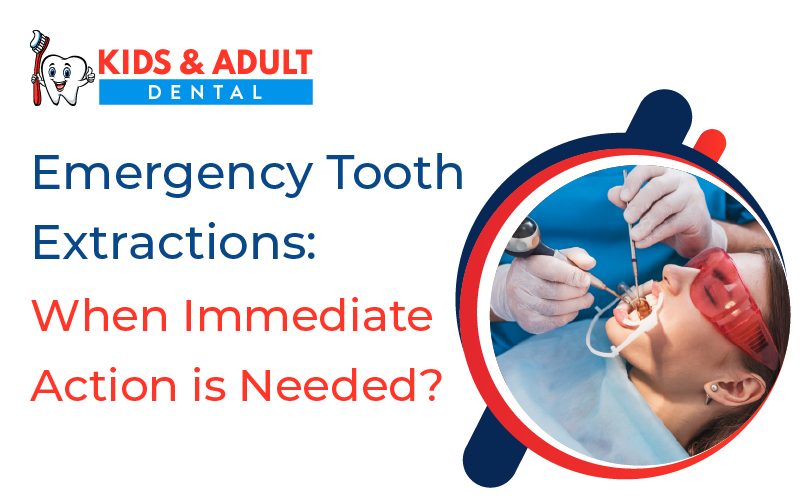Emergency dental extractions are a vital response in cases where immediate action is required to reduce severe pain or widespread infection, signifying that the tooth is beyond repair. These last-minute treatments happen without warning and are usually performed by a skilled dentist who is on call in order to prevent any more dental emergencies.
This method emphasizes how crucial it is to provide patients with timely and compassionate care during dental crises. By doing so, patients may be guaranteed to receive the comfort they need right now and the care they need to keep things from getting worse, protecting their oral health and general well-being.
What is an Emergency Tooth Extraction?
When dental issues develop quickly and pose a serious risk of infection or severe discomfort, an emergency tooth extraction becomes necessary. This is in contrast to routine dental appointments, which are carefully scheduled in advance. In order to minimize suffering and address the dental emergency, emergency extractions are performed quickly.
In order to provide immediate comfort and stop any further issues from developing, these situations necessitate quick action. It becomes necessary for skipping the typical wait times for dental appointments—and guarantee that the well-being of the patient is prioritized and handled with the highest care and efficiency.
Indications for Urgent Tooth Extraction
You should seek immediate care from a nearby dentist or an emergency dental clinic in Littleton if you experience-
- Intense toothache that over-the-counter medications cannot alleviate.
- Swelling in the face near the affected tooth.
- Persistent bleeding in the mouth.
- Pus discharge from the gum around a tooth.
- A tooth that is significantly damaged, revealing the nerves and pulp.
These signs suggest that the tooth may have reached a critical stage of infection or damage and might need to be removed to prevent further complications.
Common Reasons for Emergency Removal
Emergency tooth extractions are often necessitated by-
- An abscessed tooth, where a bacterial infection at the root tip is beyond the help of antibiotics.
- A severely cracked tooth with exposed pulp, causing unbearable pain.
- A horizontally impacted wisdom tooth affecting adjacent teeth and causing infection.
- A tooth that is severely damaged due to trauma and cannot be repaired.
In such cases, emergency removal is crucial to alleviate pain and stop the spread of infection.
What Happens During an Emergency Extraction?
Even in urgent situations, dentists follow a protocol to ensure patient safety and comfort-
- Examination and possibly imaging to identify the problematic tooth.
- Administration of a local anesthetic to numb the area.
- Additional sedation may be provided for comfort if necessary.
- The tooth is carefully extracted, with efforts to preserve the surrounding tissues.
- Managing bleeding and, if necessary, placing sutures.
- Providing post-operative care instructions to manage pain, and swelling, and promote healing.
Read Also: Tooth Extraction vs. Root Canal: Which Treatment Should You Choose?
Post-Extraction Care and Follow-up
After an emergency extraction, it’s crucial to diligently follow a regimen of care after tooth extraction to ensure optimal healing and minimize the risk of complications. This includes adhering to your dentist’s instructions on managing pain, keeping the extraction site clean, and avoiding activities that could disrupt the healing process, such as smoking or using a straw, which can lead to issues like dry sockets.
- Adhere to any prescribed antibiotics and pain management medications.
- Keep any follow-up appointments for suture removal or check-ups, typically within 7-10 days.
- Limit physical activity during the initial healing period.
- Start rinsing gently after 24 hours to keep the extraction site clean and prevent infection, aiding in tooth extraction healing.
Wisdom Tooth Extractions and Prevention
Wisdom teeth are often the culprits of emergency extractions due to infection. In some cases, these teeth are removed proactively to avoid future problems, a procedure known as wisdom tooth removal. However, when symptoms of infection or impaction arise, immediate removal by an oral surgeon might be necessary.
Although not all extractions can be avoided, maintaining good oral hygiene, including regular brushing, flossing, and dental check-ups, can minimize the need for tooth removal. Early intervention for dental issues, such as cavities, can also prevent the need for more drastic measures like tooth extraction.
Conclusion
For dental extractions, urgent tooth removal, and post-extraction care, consulting with experienced professionals is crucial. Dentist near me searches can lead you to Dr. Amir Feredouni, a trusted dentist specializing in tooth extraction at a reliable emergency dental clinic in Denver colorado. Prompt attention to dental emergencies is vital for preventing further discomfort and ensuring proper healing. Furthermore, incorporating dentist in Littleton into your search criteria expands your options for obtaining expert dental care, thereby enhancing your access to specialized services in multiple locations for a well-rounded approach to dental health.


